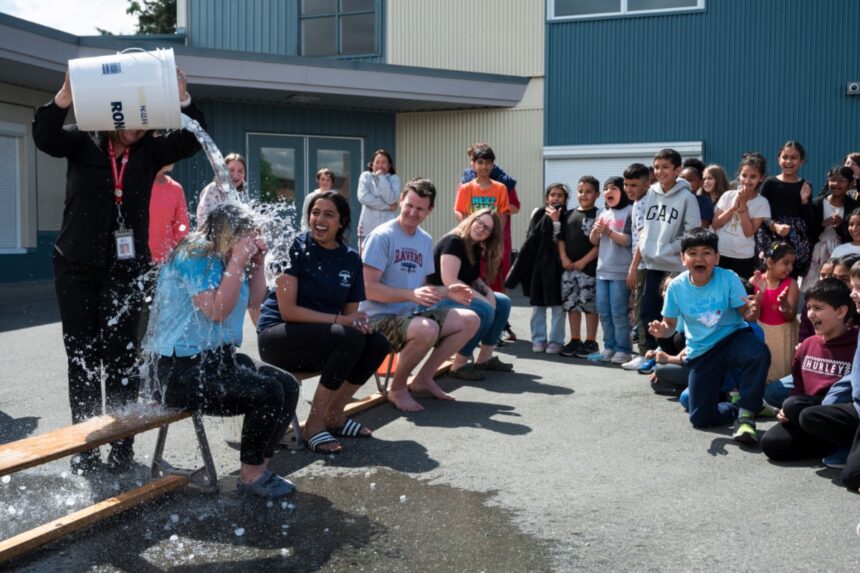It’s a frigid afternoon in North Delta as staff members at Richardson Elementary stand shivering on the playground, towels draped around their shoulders. The February wind cuts through their sweaters, but their smiles remain intact. These educators aren’t just braving the cold – they’re preparing to get significantly colder.
“I’m already regretting this,” laughs Principal Tim Cavey, as he eyes the large tub of ice water before him. “But honestly, it’s worth every goosebump.”
The Richardson Elementary staff have revived the ice bucket challenge, but with a crucial twist. Their frigid dunking isn’t aimed at ALS awareness like the viral sensation from 2014, but instead focuses on children’s mental health – an issue that’s become increasingly pressing in classrooms across British Columbia.
The fundraiser, organized by the school’s leadership team, has already collected over $3,000 for the Kids Help Phone, surpassing their initial $2,000 target with remarkable speed.
“The response from our community has been overwhelming,” explains Vice Principal Megan Clarkson, her voice catching slightly as she discusses the initiative. “Parents, local businesses, even former students – everyone recognizes that supporting youth mental health isn’t optional anymore. It’s essential.”
The statistics supporting their concern are sobering. According to the Canadian Mental Health Association, approximately 1.2 million children and youth in Canada are affected by mental illness, yet less than 20 percent receive appropriate treatment. In British Columbia specifically, the Ministry of Mental Health and Addictions reports that calls to youth crisis lines increased by 28 percent between 2019 and 2022.
The scene at Richardson Elementary reflects a changing approach to mental health awareness in schools throughout Delta School District. Rather than treating mental wellness as a separate subject, educators are increasingly integrating it into daily classroom life.
“Kids today face pressures we couldn’t have imagined when we were their age,” says Grade 3 teacher Mark Bellinger, who helped organize the event. “Between social media, academic expectations, and now the lingering effects of pandemic isolation, they’re navigating a complex world. Our job isn’t just teaching curriculum – it’s helping them develop the emotional resilience to thrive.”
As the first brave staff member steps up to the challenge, students cheer from the sidelines. The moment of impact – ice water cascading over PE teacher Sam Richards – draws gasps and laughter. Richards emerges spluttering but triumphant, high-fiving students as he wraps himself in a towel.
“That was… invigorating,” he manages through chattering teeth. “But you know what? Our kids deal with challenges every day that are a lot tougher than cold water.”
The North Delta community has embraced the fundraiser with characteristic warmth. Local coffee shop Beans & Things provided hot beverages for participants, while Delta Sports Equipment donated towels. Parents volunteered to help set up and clean up, many sharing personal stories about why children’s mental health matters to their families.
“My daughter struggled with anxiety during the pandemic,” shares parent volunteer Anita Sharma, watching the proceedings. “The school’s counselor made all the difference. Not every family has access to those resources, though. That’s why initiatives like this matter.”
The funds raised will support Kids Help Phone’s text and call services, which provide 24/7 support to young people across Canada. Last year alone, the organization responded to over 4 million connections from youth seeking mental health support.
Katherine McMillan, regional director for Kids Help Phone in British Columbia, attended the event to express gratitude to the school community.
“Every dollar raised today translates into real support for kids who might be experiencing the hardest moments of their young lives,” McMillan explains. “What these educators are demonstrating goes beyond fundraising – they’re modeling vulnerability, resilience, and community care for their students.”
As the challenges continue, each educator takes their turn with good humor and dramatic flair. Music teacher Dana Wilson performs an operatic scream as the water hits, while kindergarten teacher Liam Peterson does a dance beforehand that has the students in stitches.
Between dunks, students from the school’s leadership club share facts about mental health with their peers, emphasizing that mental wellness affects everyone and that asking for help shows strength, not weakness.
“We learned that your mental health is just as important as your physical health,” says Grade 6 student Jayden Wong, who helped create informational posters for the event. “And just like you’d tell someone if you broke your arm, it’s okay to tell someone if you’re feeling sad or worried all the time.”
The Richardson Elementary initiative comes at a time when schools across Delta are expanding their mental health programs. Last month, the Delta School Board approved additional funding for counseling services and teacher training on recognizing early signs of mental health challenges in students.
Superintendent Doug Sheppard, who made an appearance to support the event (and yes, took his turn under the ice water), emphasized the district’s commitment.
“What we’re seeing here today is education at its finest,” Sheppard said, still dripping. “These educators are teaching compassion, community involvement, and the importance of breaking stigma around mental health conversations. Those lessons will stay with students long after they’ve forgotten their multiplication tables.”
As the final staff member completed the challenge, the school community gathered for a group photo – shivering educators surrounded by beaming students. The picture captured something powerful: a community willing to get uncomfortable for a cause that matters.
Principal Cavey, addressing students as the event concluded, connected the discomfort of the ice water to larger life lessons.
“Today, your teachers willingly did something difficult because we believed in something important,” he said. “Remember that feeling when you face your own challenges. Sometimes the most worthwhile things in life make us uncomfortable at first, but we grow stronger through them.”
The Richardson Elementary ice bucket challenge may have left staff with chattering teeth, but it also left the North Delta community with something more enduring: an example of how local action can address a national concern, one bucket of ice water at a time.






